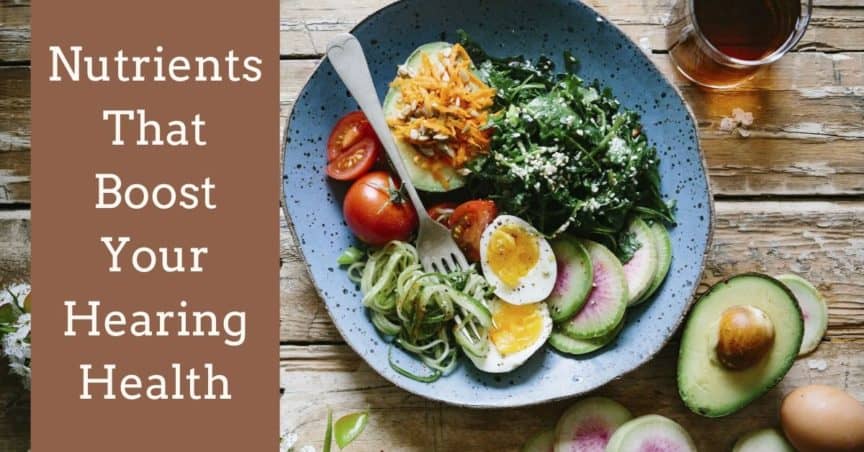- How to Care for Infants With Hearing Loss - April 15, 2024
- Hearing Aid Tips for Runners - April 5, 2024
- Overcoming Misconceptions Around Hearing Aids - March 27, 2024
We know that just about everyone who lives long enough experiences some degree of hearing loss. Nearly 100% of centenarians have hearing loss. Recent research shows that there is likely a genetic component to all forms of hearing loss, including noise-induced hearing loss, but that doesn’t mean our hands are tied when it comes to protecting our hearing as best we can. It’s still extremely important to wear earplugs or other hearing protection in noisy environments. Doing our best to protect our hearing could be the difference between minimal hearing loss and total hearing loss.
A four-year study by Brigham & Women’s Hospital has demonstrated that a healthy diet also has a profound effect on maintaining one’s hearing ability into old age. Those participants who adhered closely to AMED (Alternate Mediterranean Diet) and DASH (Dietary Approaches to Stopping Hypertension) over a 20-year period leading up to the study had significantly reduced risk and degree of hearing loss over a four-year period in their mid-50s to mid-60s, when hearing loss is now thought to begin, though is usually not tested regularly.
It may not come as a surprise that healthy eating is good for hearing ability, as it is so often demonstrated to be good for so many other aspects of health. While there is no direct correlation between hearing health and any one vitamin or mineral (like Vitamin D for bone health or Vitamin A for vision), we can take a look at some of the nutrients implicated in an overall healthy diet, and which foods contain them.
Vitamin B-9 (Folate)
There is a long-established link between serum folate and hearing loss. Repeated studies have found that those participants with the most significant hearing loss also have the lowest levels of serum folate. Foods that are rich in folate include nuts, eggs, beans, broccoli, spinach, asparagus, and liver.
Vitamin B-12
Foods that are especially rich in vitamin B-12 are usually animal foods: meat, dairy, fish and eggs. Vegetarians and vegans should use B-12 supplements to make sure they’re getting enough of this essential nutrient.
The same studies that have shown a link between folate and hearing loss have also implicated Vitamin B-12. Both vitamins likely contribute to lower homocysteine levels in the body, which promotes blood flow to the cochlea, where mechanical sound is transduced (converted) to electrical energy. Better blood flow to the cochlea is helpful in preventing not only age-related hearing loss, but also noise-induced hearing loss.
Higher blood flow is the opposite of inflammation. Inflammation, a known cause of many problems in the body, does its damage by constricting blood flow, which prevents proper oxygenation and cell regeneration.
Signs that you might be suffering from chronic inflammation include tiredness, fever, redness, swelling, and pain. If you are suffering from chronic inflammation, you are at increased risk for hearing loss, among the loss of other body functions. You should talk to your doctor about steps you can take to reduce inflammation in your body.
Omega-3 Fatty Acids
It’s crucial that our bodies maintain an appropriate balance between omega-3 and -6 fatty acids. Our bodies don’t produce either of these substances on their own, so it’s important to make sure the foods we eat already contain them. Unfortunately, most Americans’ diets are higher in omega-6. The currently-recommended approach to better health is reducing consumption of omega-6 fatty acids while increasing consumption of omega-3’s.
To reduce your intake of omega-6 fatty acids, eat fewer almonds, cashews, safflower oil, hemp seed, sunflower seed, peanut butter, avocado oil and cheap eggs. To increase your intake of omega-3’s, eat more flaxseed, grass-fed beef or lamb, free-range eggs, and fatty fish like salmon, sardines and mackerel. Some foods, like walnuts and tofu, are high in both.
Vitamins A, E & C
All three are considered antioxidants, though vitamin C is water-soluble while vitamins A & E are fat-soluble. It’s likely the anti-inflammatory action these vitamins exhibit that gives the people who eat them an edge over hearing loss. To reap the benefits of more vitamins A & E, eat more carrots, sweet potatoes, kale, spinach, broccoli, eggs, almonds, avocados, sunflower seeds, butternut squash, olive oil, and beef liver. You’ll find vitamin C in high amounts in citrus fruits, but also in papaya and strawberries, as well as non-fruits like the darker leafy greens, bell peppers, broccoli, and Brussels sprouts. It’s very hard (though still possible) to overdose on vitamin C, so if you feel like you could use a little more, don’t be afraid to add in a supplement.
Treating Hearing Loss
If you are concerned about your hearing abilities, contact us today to schedule a hearing test! We provide comprehensive hearing health services and are here to help.

